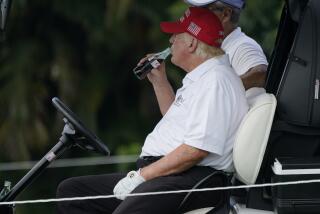Some marijuana tax revenue is better than none
- Share via
It is no surprise that America’s present and former drug czars oppose the passage of Proposition 19, the Regulate, Control and Tax Cannabis Initiative of 2010. After all, the drug czar is required by law “to oppose any attempt to legalize the use of a substance that is listed in schedule I of section 202 of the Controlled Substances Act.” In other words, it would actually be illegal for President Obama’s drug czar, Gil Kerlikowske, to voice an opinion that didn’t publicly condemn the measure.
Nevertheless, Kerlikowske’s opposition to Proposition 19 is still worth addressing, as his claim is a fairly common one. In a nutshell, Kerlikowske et al argue that, if legalized, marijuana’s perceived social costs would outweigh the economic benefits reaped by regulation. They base this allegation largely on the premise that present taxes on alcohol and cigarettes fail to adequately pay for the societal costs associated with those drugs’ use and abuse. True enough, but here’s why this sound bite is irrelevant to the present marijuana debate.
Marijuana is safer than alcohol.
Alcohol is toxic to healthy cells and organs, a side effect that results directly in about 35,000 deaths a year from illnesses such as cirrhosis of the liver, ulcers, cancer and heart disease. Heavy alcohol consumption can depress the central nervous system — inducing unconsciousness, coma and death — and is strongly associated with increased risks of injury. According to federal statistics, alcohol plays a role in about 41,000 fatal accidents a year and in the commission of about 1 million violent crimes annually.
By contrast, the active compounds in marijuana, known as cannabinoids, are remarkably nontoxic. Unlike alcohol, marijuana is incapable of causing a fatal overdose, and its use is inversely associated with aggression and injury. In fact, the recently released Rand Corp. report found that in 2008, there were fewer than 200 “admissions to hospitals in which marijuana abuse or dependence was listed as the primary reason for the hospitalization.” By comparison, there are more than 70,000 hospitalizations in California annually related to the use of alcohol.
Marijuana is far safer than tobacco.
According to a 2009 report by the Canadian Centre on Substance Abuse, health-related costs per user are eight times higher for drinkers than they are for those who use cannabis, and are more than 40 times higher for tobacco smokers. It states: “In terms of (health-related) costs per user: tobacco-related health costs are over $800 per user, alcohol-related health costs are much lower at $165 per user, and cannabis-related health costs are the lowest at $20 per user.”
A previous analysis commissioned by the World Health Organization agreed, stating, “On existing patterns of use, cannabis poses a much less serious public health problem than is currently posed by alcohol and tobacco in Western societies.” So then why is the drug czar so worried about adults consuming it in the privacy of their own home?
Some tax revenue is better than no tax revenue.
According to a 2007 George Mason University study, U.S. citizens each year spend about $113 billion on marijuana. Under prohibition, all of this spending is directed toward an underground economy and goes untaxed. That means state and local governments are presently collecting zero dollars to offset societal and health costs related to recreational marijuana use. Therefore, the imposition of any retail tax or excise fee would be an improvement over the current situation.
In short, the drug czars’ assessment that present taxes on alcohol and tobacco — two deadly products — do not raise sufficient funding to offset their related social costs is not an argument in favor of maintaining the status quo, particularly when one recognizes that the social and health costs related to cannabis use are far less than those associated with the use of other intoxicants.
Despite more than 70 years of federal prohibition, marijuana is here to stay. It’s time to acknowledge this reality, and to cease ceding control of the commercial marijuana market to unregulated, untaxed criminal enterprises and put it in the hands of licensed businesses. Proposition 19 is a first, significant step in this direction.
Paul Armentano is the deputy director of the National Organization for the Reform of Marijuana Laws and is the coauthor of the book “Marijuana Is Safer: So Why Are We Driving People to Drink? (Chelsea Green, 2009).
More to Read
Sign up for Essential California
The most important California stories and recommendations in your inbox every morning.
You may occasionally receive promotional content from the Los Angeles Times.










